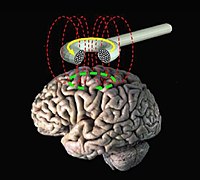
Effectiveness of Standard Sequential Bilateral Repetitive Transcranial Magnetic Stimulation vs Bilateral Theta Burst Stimulation in Older Adults With Depression
Sign Up to like & getrecommendations! Published in 2022 at "JAMA Psychiatry"
DOI: 10.1001/jamapsychiatry.2022.2862
Abstract: This randomized noninferiority trial establishes the effectiveness and tolerability of theta burst stimulation compared with standard repetitive transcranial magnetic stimulation in older adults with treatment-resistant depression. read more here.
Keywords: theta burst; burst stimulation; magnetic stimulation; repetitive transcranial ... See more keywords

Combined transcranial magnetic stimulation in the treatment of chronic tinnitus
Sign Up to like & getrecommendations! Published in 2018 at "Annals of Clinical and Translational Neurology"
DOI: 10.1002/acn3.587
Abstract: Repetitive transcranial magnetic stimulation (rTMS) is currently being tested for suppressing the symptoms of subjective chronic primary tinnitus, although its effect is controversial. The aim of this randomized double‐blinded controlled trial was to determine the… read more here.
Keywords: treatment; combined transcranial; transcranial magnetic; magnetic stimulation ... See more keywords

Classification Accuracy of Transcranial Magnetic Stimulation for the Diagnosis of Neurodegenerative Dementias
Sign Up to like & getrecommendations! Published in 2020 at "Annals of Neurology"
DOI: 10.1002/ana.25677
Abstract: Transcranial magnetic stimulation (TMS) has been suggested as a reliable, noninvasive, and inexpensive tool for the diagnosis of neurodegenerative dementias. In this study, we assessed the classification performance of TMS parameters in the differential diagnosis… read more here.
Keywords: diagnosis neurodegenerative; diagnosis; neurodegenerative dementias; transcranial magnetic ... See more keywords

Neuroprotection of Low‐Frequency Repetitive Transcranial Magnetic Stimulation after Ischemic Stroke in Rats
Sign Up to like & getrecommendations! Published in 2022 at "Annals of Neurology"
DOI: 10.1002/ana.26509
Abstract: Stroke is a leading cause of human death and disability. Effective early treatments with reasonable therapeutic windows remain critically important to improve the outcomes of stroke. Transcranial magnetic stimulation (TMS) is an established noninvasive technique… read more here.
Keywords: low frequency; magnetic stimulation; frequency repetitive; stroke ... See more keywords

Repetitive transcranial magnetic stimulation therapy for motor recovery in Parkinson's disease: A Meta‐analysis
Sign Up to like & getrecommendations! Published in 2018 at "Brain and Behavior"
DOI: 10.1002/brb3.1132
Abstract: Therapeutic effects of repetitive transcranial magnetic stimulation (rTMS) on motor recovery of Parkinson's disease (PD) have been reported; however, the protocols of these studies varied greatly. The aim of this meta‐analysis was to evaluate the… read more here.
Keywords: recovery; repetitive transcranial; transcranial magnetic; magnetic stimulation ... See more keywords

A retrospective analysis of bipolar depression treated with transcranial magnetic stimulation
Sign Up to like & getrecommendations! Published in 2020 at "Brain and Behavior"
DOI: 10.1002/brb3.1805
Abstract: Treatment options are limited for patients with bipolar depression. Antidepressants added to mood stabilizers even carry risks of precipitating mixed/manic episodes. Transcranial magnetic stimulation (TMS) may provide a safe and effective option for these patients. read more here.
Keywords: retrospective analysis; bipolar depression; transcranial magnetic; magnetic stimulation ... See more keywords

Modulating intrinsic functional connectivity with visual cortex using low‐frequency repetitive transcranial magnetic stimulation
Sign Up to like & getrecommendations! Published in 2022 at "Brain and Behavior"
DOI: 10.1002/brb3.2491
Abstract: Intrinsic network connectivity becomes altered in pathophysiology. Noninvasive brain stimulation can modulate pathological functional networks in an attempt to restore the inherent response. To determine its usefulness for visual‐related disorders, we developed procedures investigating repetitive… read more here.
Keywords: connectivity; magnetic stimulation; repetitive transcranial; visual cortex ... See more keywords

Effects of repetitive transcranial magnetic stimulation on gait disorders and cognitive dysfunction in Parkinson's disease: A systematic review with meta‐analysis
Sign Up to like & getrecommendations! Published in 2022 at "Brain and Behavior"
DOI: 10.1002/brb3.2697
Abstract: Repetitive transcranial magnetic stimulation (rTMS) is acknowledged to be crucial to manage freezing of gait (FOG) and cognitive impairment for patients with Parkinson's disease (PD), but its effectiveness is unclear. read more here.
Keywords: magnetic stimulation; parkinson disease; repetitive transcranial; transcranial magnetic ... See more keywords

Predictors of response to synchronized transcranial magnetic stimulation for major depressive disorder
Sign Up to like & getrecommendations! Published in 2019 at "Depression and Anxiety"
DOI: 10.1002/da.22862
Abstract: Synchronized transcranial magnetic stimulation (sTMS) is a new modality to reduce symptoms of major depressive disorder (MDD). sTMS uses rotating neodymium magnets to deliver low‐field stimulation matched to the individual alpha frequency (IAF). A previous… read more here.
Keywords: depressive disorder; synchronized transcranial; stimulation; major depressive ... See more keywords

Therapeutic efficacy of connectivity‐directed transcranial magnetic stimulation on anticipatory anhedonia
Sign Up to like & getrecommendations! Published in 2021 at "Depression and Anxiety"
DOI: 10.1002/da.23188
Abstract: There are currently no effective treatments specifically targeting anticipatory anhedonia, a major symptom of severe depression which is associated with poor outcomes. The present study investigated the efficacy of individualized repetitive transcranial magnetic stimulation (rTMS)… read more here.
Keywords: anticipatory anhedonia; anticipatory; transcranial magnetic; magnetic stimulation ... See more keywords

Psychostimulant use and clinical outcome of repetitive transcranial magnetic stimulation treatment of major depressive disorder
Sign Up to like & getrecommendations! Published in 2022 at "Depression and Anxiety"
DOI: 10.1002/da.23255
Abstract: Repetitive transcranial magnetic stimulation (rTMS) is an effective treatment for major depressive disorder (MDD). Psychostimulant medication use may be associated with improved rTMS outcomes, but a detailed understanding of these relationships is lacking. read more here.
Keywords: magnetic stimulation; treatment major; repetitive transcranial; transcranial magnetic ... See more keywords